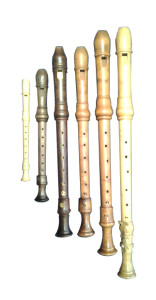Mark Bennett writes:
I started learning the recorder in 1995, as a way to be able to take music on holiday! What started as a self-teaching project in a cottage in Brittany has ended up as a lifelong obsession.
I soon started lessons with Nancy Daly and the benefits of working with a specialist recorder player, rather than, say, a flautist who played the recorder as a child, were obvious. Further lessons with Sue Sherratt (once a specialist recorder player, now a harpist!) consolidated grade 8 distinction, then I studied towards my first diploma programme with Jonathan Morgan.

some of Mark`s recorders: low pitch baroque Denner sopranino, Terton descant, Bressan and Denner trebles, Denner voice flute, Rottenburgh tenor
With the recorder available in so many different sizes, it can be learned as soon as a child is capable of holding the instrument and moving one finger at a time - potentially from the start of primary school. One student who started with me in 2013 at the age of seven, having begun learning with her grandfather, took her Grade 7 exam at the age of nine in 2015. There is no secret to her progress - she practised every day, the practice was often supervised, she listened to performances of the music she played and she played in groups whenever she could.
Clarinettists particularly benefit from learning the recorder, as it gives the access to another seven hundred years of music before their instrument was invented. In fact the recorder died out as a mainstream classical instrument almost exactly as the clarinet came into being. A disproportionate number of my students started as clarinettists and find themselves more rounded musicians by studying the two instruments alongside each other - especially those who love jazz and improvisation, as the advanced recorder repertoire needs exactly the same skills of being able to add notes to existing tunes and even create whole melodies over chord frameworks.
With learners who already play the recorder, we start with a careful check through grip and posture. Musicians should be comfortable when they play, so I use my knowledge of Alexander Technique and anatomy to help players find ways of playing that minimise tension. Speed and agility on the instrument come from mechanically efficient movement. We also work on understanding memory, not only to memorise pieces, but also to assemble individual notes into sequences of "muscle memory" (procedural memory), so that there is no such thing as a passage you can't play - only a passage that you haven't finished practising yet! The most important thing, I think, that my students learn from me is how to practise - that makes them independent of me. Once a learner understands what practice is for and has the discipline to do it regularly, lessons become coaching sessions with me as a "critical friend".
I love playing in ensembles, so duets are always a feature of lessons - this is where we learn the skills of playing in tune and precisely in time. After a few years of learning either C fingering (descant and tenor) or F fingering (sopranino, treble and bass), we will begin learning the other fingering, so that all instruments can be played, including reading bass clef for the bass recorder - and indeed great bass and contrabass! This is one of the real highlights of learning the recorder - you can play in groups and be a bass line, a harmony part or a prominent melody, each of which needs different listening skills. As I first intended when I started, the recorder has always been a very social instrument for me, and there are always others who are just as keen to play too - see links below.
For players who want to specialise in early music, it is a real joy to share my passion for period instrument copies at (standardised) original pitches. It can seem futile to buy a low pitch instrument if you don't know other players who play at that pitch - but we can muster a harpsichord, baroque flute, baroque oboe and viola da gamba - and we have friends!
Links:
Stephan Blezinger - recorder maker in Eisenach, Germany
Tim Cranmore - recorder maker in Malvern
The Early Music Shop - all early instruments, based in Bradford and London
The London Recorder Centre - the London branch of The Early Music Shop, specialising in recorders
Saunders Recorders - a specialist recorder dealer, based in Bristol but working only online nowadays
The Society of Recorder Players - local branches in Truro and Exeter - the website gives history of instrument, articles on technique and listings of playing groups, performers and teachers
Recorders@Plymouth - a very friendly adult playing group that meets monthly in Hartley, Plymouth. I co-direct the group with Ian Hiscock, though the group has a very full programme of visiting conductors as well
Exeter Recorder Orchestra - a more standardised ensemble that regularly uses the great bass and contrabass recorders, directed by London recorder player Andrew Colllis
Memrise - my course on learning descant fingerings from scratch, including a level on alternative fingerings for advanced players